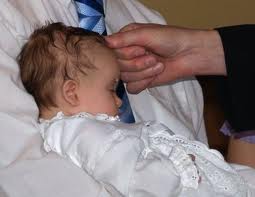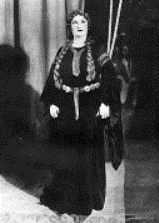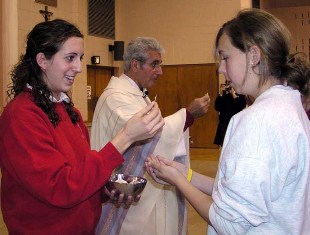
What is baptism?
This is the first and basic sacrament of Christian initiation. To baptise means to immerse and the early Christians were baptised using either total immersion in water or partial immersion while water was poured over them. In the Catholic Church of today, in Ireland, where we use the Latin Rite of the Church, baptism is usually conferred by pouring a little water three times on the recipient’s head, while reciting words taken from Matthew’s gospel, “I baptise you in the name of the Father and of the Son and of the Holy Spirit” [ Matthew 28:19 ].
The baptism of infants is often referred to as christening which we think of as a naming ceremony. But to christen is really to Christ-en. The child’s name is usually added to the beginning of the words of baptism as in “Mary, I baptise you in the name of …” Most Christians were babies when they were baptised but adults, too, are baptised if they become Christians later in life. When baptised, the recipient is freed from all sins and enters into the life of the Church.

What about anointing?
The Greek word cristos means “anointed” and Jesus was called the Christ, the anointed one, because he was rather special. In biblical times, people were anointed with oil to signify God’s blessing or call on that person’s life. Anointing is also part of the baptismal ceremony in which a little perfumed oil is rubbed or smeared on the forehead and chest of the recipient.
This is what Jesus had to say about His own anointing when He first began to preach:
“The Spirit of the Lord is upon me, because he has anointed me to proclaim good news to the poor. He has sent me to proclaim liberty to the captives and recovering of sight to the blind, to set at liberty those who are oppressed, to proclaim the year of the Lord’s favour.†[ Luke 4:18-19 ].
The symbols of baptism
The many symbols of baptism include a white garment, symbolising innocence and purity; a candle, symbolising the Light of Christ; the sacred chrism (a Greek word that means an anointing), which is used to anoint the recipient; and the water, which symbolises cleansing and the washing away of sin.
Sponsors, Godparents, and Witnesses
The role of the sponsor is to assist an adult in Christian initiation or, together with the parents, to present a child for baptism and to help it to live a Christian life befitting the baptised and to fulfil faithfully the duties inherent in baptism. Only one sponsor is needed who may be a man or a woman, but there can be two who must be a man and a woman. Also, each sponsor must be a Catholic at least sixteen years old who has been confirmed and has already received the sacrament of the Eucharist and who leads a life of faith in keeping with the function to be taken on. The recipient’s father or mother cannot be sponsors.
The sponsors are sometimes called godparents but this is not the official title. There can be as as many godfathers and godmothers as are wanted but only the sponsors may be registered in the baptismal record. A witness is a baptised non-Catholic Christian who participates in the ceremony together with one of the sponsors. Witnesses are also named in the baptismal record. Of course, if you have non-Catholic friends or relatives, they may attend the ceremony without taking part in it in the way that an official witness does.
Baptism at Pisa
 At baptism, a person becomes a member of the Church. Traditionally, this was signified by holding the rite (or ceremony) of baptism outside the doors of the main part of the church. In some large churches a separate building, the baptistery, was used for baptism and for instructing the catechumens (those adults who wished to become members of the Church). The recipient entered the baptistery by one door and, after baptism, left by a second door. This led to the main door of the church which the newly baptised person was now permitted to enter. The photograph shows the magnificent baptistery in the Piazza del Duomo in Pisa, Italy. Two of the Fenor churches, one on top of the other, would fit nicely inside the baptistery. Most churches don’t have such a baptistery but the ceremony usually begins at the door of the church where everyone is welcomed by the priest.
At baptism, a person becomes a member of the Church. Traditionally, this was signified by holding the rite (or ceremony) of baptism outside the doors of the main part of the church. In some large churches a separate building, the baptistery, was used for baptism and for instructing the catechumens (those adults who wished to become members of the Church). The recipient entered the baptistery by one door and, after baptism, left by a second door. This led to the main door of the church which the newly baptised person was now permitted to enter. The photograph shows the magnificent baptistery in the Piazza del Duomo in Pisa, Italy. Two of the Fenor churches, one on top of the other, would fit nicely inside the baptistery. Most churches don’t have such a baptistery but the ceremony usually begins at the door of the church where everyone is welcomed by the priest.
Planning and Forethought
As well as being of religious significance for the recipient, baptism is also an important religious and social occasion for family and friends. As such, it requires some forethought and planning. Here is a checklist that may be helpful:
- Confirm dates for baptism preparation.
- Confirm date for baptism.
- Think about possible scripture readings.
- Choose sponsors and godparents.
- Choose witnesses, if appropriate.
- Prepare prayers of intercession.
- Plan your family celebration.












 Newsletters
Newsletters





